Imagine you are in the vast meadow of dandelions with your beloved dog, and he is chasing after dandelions in the wind trying to catch them with his mouth. But can dogs eat dandelions?
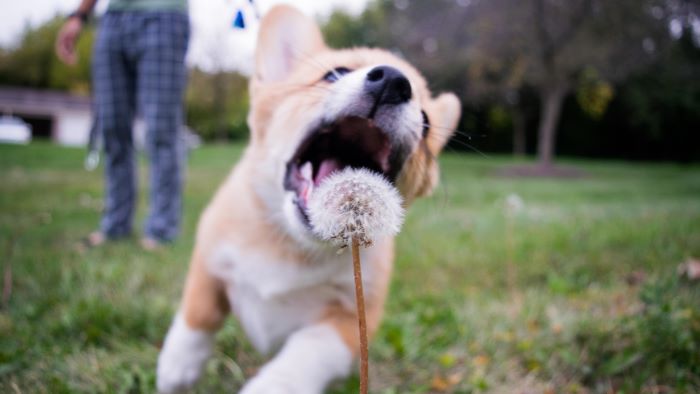
We are here to find out about dandelion’s effect on dogs, potential risks and alternatives available, so let’s begin!
Can Dogs Eat Dandelions?
Dandelions are flowering plants native to Europe. They are widespread and commonly found in various regions worldwide, including Europe, Asia, and North America. Their seeds disperse easily by wind.
Once matured dandelions transform into round heads called “dandelion clocks” or “blowballs”, people enjoy watching the seeds scatter and spread to new places. Even dogs like to nibble on dandelions.
Dandelions are safe for your dogs to eat, as they contain a variety of nutrients that can improve their health benefits for dogs. Here are some of the benefits[1]:
- Immune System: They contain vitamin A and some vitamin B, which can improve the immune system and boost energy levels. This can help to prevent infections and diseases.
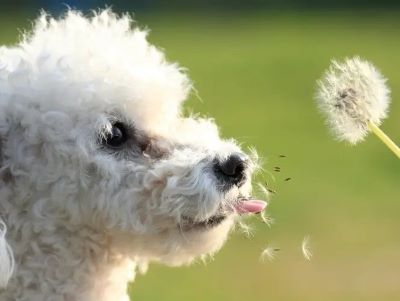
- Improved Digestion: They contain probiotics that can enhance a dog’s gut health and increase the number of good bacteria in the digestive tract. This can remedy indigestion and maintain the dog’s body weight.
- Strong Bones and Teeth: Potassium and Manganese work with calcium in a dog’s body to build strong bones and teeth.
- Skin and Coat: This can soothe skin irritations and infections with anti-bacterial properties, also promote blood circulation and nourish the skin and coat it with essential fatty acids.
- Fresh Breathe: It can act as a natural breath freshener for dogs to cleanse their mouth and digestive system. Also, prevents plaque buildup and tooth decay by stimulating saliva production.
- Healthy kidneys: Dandelions can dissolve kidney stones and flush out toxins from the urinary tract of dogs and also prevents the growth of harmful bacteria.
What Parts of the Dandelions Can Dogs Eat?
Dandelions are a rich source of vitamins, minerals, antioxidants, and probiotics that can support the overall health of dogs.
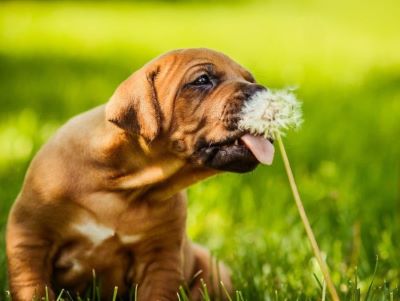
Different parts have different tastes and qualities. Here are the most nutrient-dense parts of dandelion[2]:
- Blooms: Dogs can consume flower or seed puffs. It contains high levels of antioxidants and polyphenols, that boost the immune system.
- Leaves: Greens and leaves are the most nutrient-dense part of the plant. You can add these greens to dogs’ meals to supplement the nutritional value of their daily diet. They are high in vitamins A, C, D, E, and K, also some minerals such as calcium, iron, and protein.
- Roots: Use dandelion root extract as a natural liver tonic to improve your pet’s liver function. This also improves your pet’s muscle recovery and decreases joint soreness.
Potential Risks
With all the nutritional benefits of dandelions, there are also some potential risks and precautions to consider before feeding them to dogs, here are some of them:
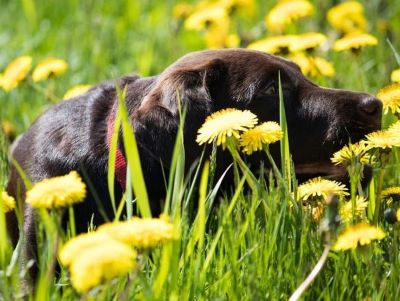
- They should be given in to avoid possible side effects such as dehydration and digestive discomfort.
- Too much dandelion can also mess up the other medication your dog may be taking
- Dandelions should be washed thoroughly and prepared properly to ensure their safety and quality
- You should chop or ground them to make them easy to digest
- You can also make dandelion tea in hot water, using flowers and leaves
- Always get them from organic or pesticide-free areas to avoid harmful chemicals
- Avoid picking from roadsides, parks, or lawns as they may have something toxic
- If your dog has health conditions then avoid dandelions as they may impact the dog’s salt intake or fluid balance
All these factors may affect your dog, so it is best to consult with the vet before introducing them into the dog’s diet. The vet will provide solutions and the right guidance according to the dog’s condition.
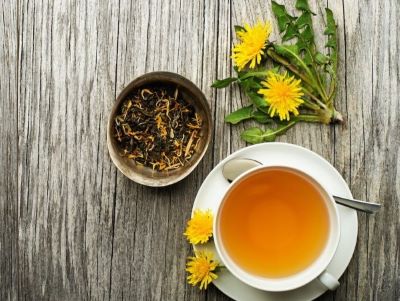
Alternative Edible Plants for Dogs
Dogs can enjoy a variety of plant-based foods in addition to their meat-based diet. While some plants are toxic, others are safe and beneficial for them. Experts at ASPCA suggested following plants are safe for dogs:
- Bamboo: Soft and crunchy plant that can be a good snack to eat. Low in calories and high in fibre, this can help with digestion. Also, boosts the immune system and supports liver
- Dill: This is an aromatic herb that can enhance the flavour of a dog’s food. Rich in iron, calcium, magnesium and vitamin A, which can help with infections and inflammation
- Basil: Another herb that can add a fresh taste to your dog’s meals. Source of many vitamins and minerals, that can help with blood clotting, metabolism, and eye health
- Fennel: High in vitamin C, iron, and fibre, which can benefit the immune system, heart health, and bone health. Also relieves gas, bloating, and cramps
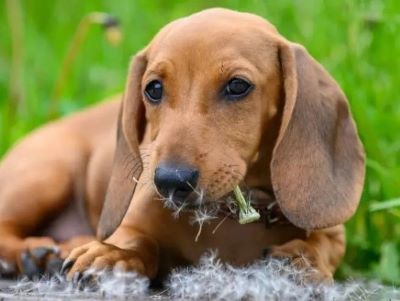
- Green Beans: Crunchy and nutritious snack for dogs. Low in calories and high in vitamin K, C and protein. This helps in immune health, bone health, and muscle growth
- Berries: Sweet and juicy treat for dogs. Berries such as cranberries, blueberries, raspberries, and strawberries are safe in moderation. Rich in vitamins and antioxidants, improves the immune system, prevents infections and improves digestion
- Barley Grasses: Young shoots of barley that are harvested before they produce grains. Rich source of chlorophyll, Vitamin A, C, E, K, iron, and amino acids, Supports the liver and promote wound healing
- Rosemary: A woody herb that has a pine-like aroma. Source of vitamin B6, antioxidants, improves blood circulation, and bone health, also prevents infections and reduces pain.
Always check the safety of food and its toxicity by consulting with the vet before feeding it to your dog. Start feeding new foods gradually to your dog.
FAQs
Are Dandelions Toxic to Dogs?
Dandelions are edible and nontoxic for dogs; however, some parts of the plant are more nutritious than others. Here are three of the most nutrient-dense parts of dandelions: Blooms: Dogs can consume the yellow flowers or seed puffs of dandelions. Dandelion blooms contain high levels of antioxidants and polyphenols.
How to Give Dandelions to Dogs?
Making a Nutritious Carrot Dandelion Juice. This juice can be fed to dogs to improve their digestion and skin conditions, as well as to support the urinary tract and cleanse the blood. Use equal proportions of dandelion leaves and/or roots and carrots and make juice using a juicer.
Which Part of the Dandelion Is Toxic?
The dandelion (Taraxacum officinale) is an abundant “weed” plant that also happens to be edible. Nearly the entire plant can be consumed in one way or another. The only inedible part is the stem, which contains a very bitter, milky substance.
Can Dogs Have Dandelion Tea?
Dandelion is an excellent whole-body tonic for your dog and you. It’s used to support the liver, kidney, heart and digestive tract. The flower has antioxidant properties and can improve the immune system. And the lecithin in it helps support the gallbladder, liver and skin issues.
What Does Dandelion Taste Like?
The leaves have a slightly bitter and tangy flavour that can be used similarly to spinach. The flowers are also edible and can be used to infuse honey and vinegar. syrups, ice cream and jellies.
Summary
In conclusion, Dandelions are a natural and beneficial treat for dogs that can improve their health and well-being. They provide essential nutrients but overfeeding can cause some potential risks too.
So, next time when you find your dog chewing on the petals or chasing the petals in the wind let them! Just look after any sign of distress.
It’s up to us as responsible pet parents to keep our furry friends healthy and happy!
Reference:
- Fletcher, J. (2023, January 10). 11 health benefits of dandelion– MNT.
- Dandelion. (n.d.). Mount Sinai Health System- Mount Sinai.



